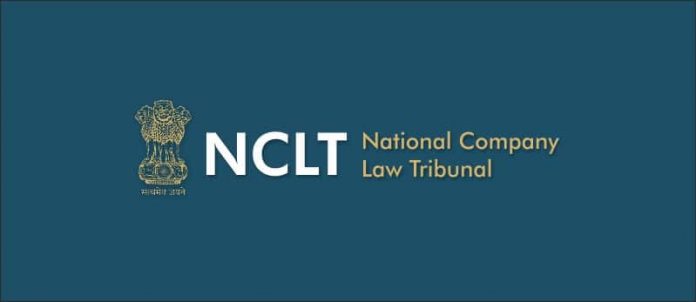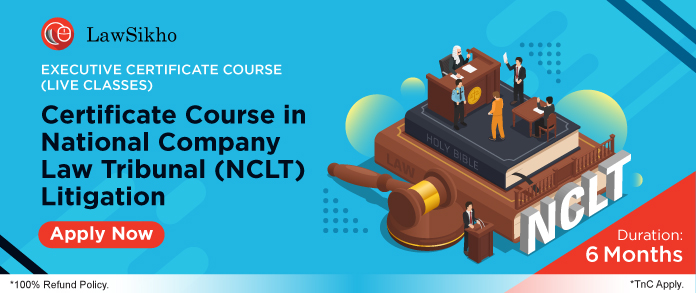This article is written by Ridhi Suri, pursuing a Certificate Course in National Company Law Tribunal (NCLT) Litigation from Lawsikho.com.
Table of Contents
Introduction
An appeal can be understood as a process or a complaint to a superior court against an order of an inferior court for any injustice done or error committed by the latter in its decision or judgement, and the court above is called upon to correct or reverse it.[1] Therefore, every law includes within its ambit the concept of appeal, in order to maintain a check and prevent any arbitrary and erroneous actions of lower courts, thereby providing remedy to the party aggrieved by such actions. Needless to say, the same is the case with company laws as well. The Ministry of Corporate Affairs, vide notification dated June 01, 2016, provided for establishment of National Company Law Tribunal (“NCLT”) and National Company Law Appellate Tribunal (“NCLAT”).[2] This is a move welcomed by corporates and litigators alike, as it provides for a specialized mechanism for company law matters as the jurisdiction of NCLT and NCLAT is limited to matters under Companies Act, 2013 and Insolvency and Bankruptcy Code, 2016 (“Code”) and therefore accelerates the ease of doing business in India. NCLAT was constituted under Section 410 of Companies Act, 2013 and exercises appellate jurisdiction against orders of NCLT.
NCLAT as the appellate authority under the code
Presently, there is only one bench of NCLAT situated in New Delhi, however constitution of another bench in Chennai has been notified by the Ministry of Corporate Affairs to handle matters arising from the southern states, i.e. Andhra Pradesh, Telangana, Karnataka, Kerala, Tamil Nadu, Puducherry and Lakshadweep, w.e.f. March 18, 2020 and the Principal Bench at New Delhi shall entertain all appeals pertaining to jurisdiction of Chennai Bench till it is made functional.[3]
Appeal under Section 61 of Insolvency & Bankruptcy Code, 2016
Section 61 of the Code lays down the mechanism for preferring appeal against the order of the Adjudicating Authority (NCLT) to the NCLAT. The appeal can be filed by ‘any person aggrieved’ by the order of NCLT. In order to avoid any errors, it is important that the appeal must conform with the checklist providing for the formatting guidelines. The essentials for filing appeal under Section 61 of the Code are as hereunder:
-
Appeal shall be filed by “person aggrieved”
Section 61(1) of the Code provides that “Notwithstanding…..any person aggrieved by the order of the Adjudicating Authority under this part may prefer an appeal to the National Company Law Appellate Tribunal.”
The term “person aggrieved” under Section 61 of the Code can be understood by a simple illustration. Suppose an application for initiation of Corporate Insolvency Resolution Process (“CIRP”) by an operational creditor under Section 9 of the Code is admitted by NCLT and an investor of the corporate debtor files an application for recalling the order of admission, and the NCLT refuses to recall or dismiss the aforesaid application u/S.9 after its admission. Now the investor files an appeal against the order of NCLT refusing to recall the admission of CIRP against the corporate debtor. The question that arises is: whether the investor can be called as a “person aggrieved’ within the meaning of the Code? The answer is negative. These are the facts of the case of Amod Amladi vs. Mrs. Sayali Rane & Anr.[4], wherein the Hon’ble NCLAT while dismissing the appeal held that “the Appellant cannot claim to be an ‘aggrieved person’ for preferring appeal against the order of NCLT.” It went on to state that the only remedy available with the investor is to file its claim before the Insolvency Resolution Professional. In simple words, a “person aggrieved” is a person who has the locus standi to approach a tribunal for substantive relief; such person is competent to prefer an appeal to the NCLAT against order of NCLT, and to the Supreme Court against decision of NCLAT.[5] The term is strictly construed and no person other than the aggrieved is entitled to file an appeal under the Code.
-
Director as “any aggrieved person”
One the application for initiating CIRP is admitted, the powers of the Board of Directors are suspended and the management of the company is handed over to the Interim Resolution Professional by virtue of Section 17 of the Code. Therefore, directors are stripped of their role of management of affairs of the company and by virtue of Section 19 of the Code, their responsibility vis-à-vis corporate debtors is limited to extending cooperation to the Interim Resolution Professional in management of the affairs of the company. Consequently, they do not enjoy the locus standi to prefer an appeal on behalf of the corporate debtor in their managerial capacity. The law was made clear by the Hon’ble Supreme Court in Innoventive Industries v ICICI Bank[6], wherein it held that “Once an insolvency professional is appointed to manage the company, the erstwhile directors who are no longer in management obviously cannot maintain an appeal on behalf of the company. In the present case, the company is the sole appellant. This being the case, the present appeal is obviously not maintainable.” Therefore, the air of confusion has been cleared by Hon’ble Supreme Court with respect to the position of directors as ‘persons aggrieved’ under Section 61 in their managerial capacity, but nothing has been said by the court about the position of directors in their fiduciary capacity, as by virtue of Section 17, only the “powers of the board of directors shall stand suspended and be exercised by the interim resolution professional”, and it is not that the directorship itself ceases to exist.[7]
-
Corporate debtor as “any aggrieved person”
It is pertinent to note that a corporate debtor is a corporate person and not a natural person and is thereby incompetent to prefer an appeal by itself. It is required to be presented by any natural person such as a director or shareholder before a court of law. Since after admission of application for initiation of CIRP, the assets and affairs of corporate debtors are managed by the resolution professional, the corporate debtor cannot prefer an appeal against order of admission of CIRP application. Such an appeal can be preferred by the promoter or shareholder of the corporate debtor in their personal capacity and the corporate debtor is to be made as ‘respondent’ represented by resolution professionals. Hon’ble NCLAT in the case of Radius Infratel Pvt. Ltd. vs. Union Bank of India[8] held that an appeal by a corporate debtor is not maintainable. Relying upon the above mentioned ratio laid down by Hon’ble Supreme Court in Innoventive Industries v ICICI Bank[9], it gave an opportunity to replace the name of the company with the name of the shareholder as the ‘appellant’.
-
Insolvency & Bankruptcy Board of India as “any aggrieved person”
The Insolvency and Bankruptcy Board of India (“IBBI”) is a regulatory body which oversees the functioning of Insolvency Professionals, Insolvency Professional Agencies and Information Utilities.[10] It has been vested with these powers and functions by virtue of Section 196 and Section 240 of the Code. Therefore, this is out of question that IBBI can qualify as an ‘aggrieved party’ under Section 61 of the Code. In Insolvency and Bankruptcy Board of India v. Wig Associates Pvt. Ltd.[11], Hon’ble NCLAT, while adjudicating upon the matter of maintainability of appeal preferred by IBBI, held that “This is very unfortunate that Insolvency and Bankruptcy Board of India (IBBI), which is a regulatory body and required to act in terms of Section 196 and Section 240 of the Insolvency and Bankruptcy Code, 2016 has preferred an appeal under Section 61, though it cannot be held to be an aggrieved person.”
-
Time period for filing appeal before NCLAT
As per Section 61(2) of the Code, the time limit for filing an appeal against the decision of NCLT is thirty days from the date of the order of NCLT. Proviso to Section 61(2) of the Code empowers the NCLAT to allow an appeal filed after the expiry of the aforesaid period of thirty days if it is satisfied that there exists a reasonable and sufficient cause behind the delay, provided such relaxation shall not exceed fifteen days. The term “sufficient cause” is not defined under the Code. In the general parlance, the expression “sufficient cause” employed by the legislature is adequately elastic to enable the courts to apply the law in a meaningful manner which subserves the ends of justice — that being the life-purpose for the existence of the institution of courts.[12]
The timeline for filing an appeal is not directory, but mandatory in nature. In Mobilox Innovations (P) Ltd. v. Kirusa Software (P) Ltd.[13], Hon’ble Supreme Court, while laying emphasis on the adherence to timelines provided under the Code, held that “An appeal can then be filed to the Appellate Tribunal Under Section 61 of the Act within 30 days of the order of the Adjudicating Authority with an extension of 15 further days and no more.”
The Central Government, vide Insolvency and Bankruptcy Code (Removal of Difficulties) Order, 2017[14], provided for a period of ninety days to prefer an appeal to NCLAT, as against the thirty-day period prescribed in the Code. This gave rise to the issue: “Whether the provision to prefer the appeal within ninety-days before the NCLAT, as made by the Central Government Notification dated 25th May, 2017 is in conflict with Section 61(2) of the ‘I&B Code’, which provides thirty-days period to prefer an appeal before the NCLAT? [15] The decision of the Hon’ble Supreme Court in the case of Pr. Director General of Income Tax (Admn. and TPS) and Ors. vs. Spartek Ceramics India Ltd. and Ors.[16] brought clarity to this point, and it was observed that the aforesaid notification of the Central Government providing for the scheme for filing appeal was framed prior to December 01, 2016, i.e. around 177 days before coming into force of the Code. The court further went on to state that the time period envisaged under Section 61 of the Code is mandatory, and held that “As per sub-section (2) of Section 61, the appeal is required to be filed within thirty days before the NCLAT. The Appellate Tribunal is empowered to condone the delay of ‘another fifteen days’ after the expiry of the period of thirty days in preferring the appeal that too for sufficient cause. It has no power to condone the delay if appeal under Section 61 is preferred beyond fifteen days from the date of the expiry of the period of thirty days. Meaning thereby, no appeal under sub-section (1) of Section 61 can be entertained after forty-five days of knowledge of the order passed by the Adjudicating Authority.” Therefore, while the Proviso to Section 61(2) empowers NCLAT to excuse the delay on being satisfied of existence of sufficient cause behind the same, this does not imply that the condonation can be sought as a matter of right. The right to appeal is exhausted on expiry of a period of thirty days and then it falls within the ambit of discretion of the court to condone the delay. Therefore, expiration of the limitation period not only extinguishes the right but also the remedy.
-
Applicability of provisions of Limitation Act on appeals under the Code
As per Section 238A of the Code, the provisions of Limitation Act, 1963 shall, as far as may be, be applicable to the proceedings and appeals before the National Company Law Appellate Tribunal. The said provision was inserted on June 06, 2018 and has retrospective application.[17] However, it must be borne in mind that Section 5 of Limitation Act, which provides for condonation of delay in case of appeals and civil suits, where the prescribed period under the Act has expired, does not apply to appeals under the Code. Section 5 of the Limitation Act does not provide for the extended time period within which the appeal can be preferred or suit can be filed, but lays down the sole requirement for satisfaction of court as to the existence of ‘sufficient cause’. Section 61 read with Section 238 of the Code makes it clear that the delay cannot be condoned beyond fifteen days, and therefore the Code prevails over the Limitation Act in matters of condonation of delay.
Further, the appellants must exercise due care and be assured of the fact that preferring an appeal is the appropriate remedy, and that is not preferred in a court not having jurisdiction to entertain it. This is because Section 14 of the Limitation Act which provides for exclusion of time period in which the party prosecuted proceedings in another court not having jurisdiction, is not applicable to appeal under Section 61 of the Code.[18] Hon’ble NCLAT, in the case of Radhika Mehra v. Vaayu Infrastructure LLP held that “Section 14 of the Limitation Act relates to exclusion of time of proceeding bona fide in court without jurisdiction, but it relates to period of limitation for any suit the time during which the plaintiff had been prosecuting with due diligence another civil proceeding. The other provision of Section 14 of the Limitation Act cannot be made applicable in this Appeal preferred under Section 61 of the I&B Code.” In the present case, the appellant had filed a writ petition in the High Court instead of preferring an appeal against the order of NCLAT. However, NCLAT refused to exclude this time period from the forty-five day period prescribed under Section 61 of the Code.
-
Date from which period of Limitation under Section 61 is to be reckoned
As per the general rule, period of limitation under any statute is to be reckoned from the date of actual or constructive communication of the impugned order to the party concerned. In case of State of Maharashtra vs. Ark Builders Pvt. Ltd.[19] the hon’ble Supreme Court ruled that “if a law prescribes that a copy of the order is to be communicated to the parties then the period of limitation can only commence from the date on which the order was received by the party concerned in the manner prescribed by the law”. Further, Section 12(2) of the Limitation Act holds the same ground and provides for exclusion of the time period requisite for obtaining a copy of the decree, sentence or order appealed from. However, in absence of any such express provision under Section 61 of the Code, NCLAT has failed to maintain consistency with respect to the date from which period of limitation is to be calculated. In Union of India vs. Vijaykumar V. Iyer,[20] NCLAT considered the date on which the certified copy of impugned order was received by the party for calculation of thirty-day period provided under Section 61 of the Code. However, a different view was taken by Hon’ble NCLAT in case of Nityanand Singh & Co. vs. Ferrous Infrastructure Pvt. Ltd.[21] wherein the NCLAT dismissed the appeal for being time barred, even though it was presented within thirty days from the date of receipt of certified copy by the appellant, but was filed after sixty days from the date of the order. In this case, Hon’ble NCLAT preferred to consider the date of impugned order as the criteria for calculating the limitation period. Therefore, it is advisable to prefer the appeal within thirty days of the order of NCLT until clarity is brought to this point.
-
Appeal against order of adjudicating authority approving resolution plan under Section 31 of the Code
As per Section 31 of the Code, the resolution plan accepted by the Committee of Creditors is required to be approved by NCLT, and pursuant to the approval it becomes binding on the corporate debtor, its employees, creditors and all the stakeholders involved in the resolution plan. If any of such persons is aggrieved by the order of NCLT approving the resolution plan, such person may approach the NCLAT under Section 61 of the Code.
Section 61(3) of the Code lays down the following grounds for preferring appeal against an order approving a resolution plan under Section 31 of the Code:
- The approved resolution plan is in contravention of the provisions of any law.
- There has been a material irregularity in exercise of the powers by the resolution professional during the corporate insolvency resolution period.
- The debts owed to operational creditors of the corporate debtor have not been provided properly in the resolution plan.
- The insolvency resolution process costs have not been provided for repayment in priority to all other debts.
- The resolution plan does not comply with any other criteria specified by the Board.
To ensure the tenability of the appeal against the approved resolution plan, it is necessary that it must fall within the above-mentioned grounds, as any other objection to the resolution plan is not considered by the NCLAT. In a case where the appellant preferred an appeal against the approval of the resolution plan, on the ground that the plan does not conform to the agreement/arrangement with the corporate debtor for purchase of a part of a project in their favour. Another ground was that the ‘Resolution Professional’ had not accepted the appellant as ‘Secured Financial Creditor’.[22] The Hon’ble NCLAT, while dismissing the appeal held that “As the Appellant(s) have failed to make out any of the grounds as mentioned in Section 61(3), we are not inclined to interfere with the plan approved by the Adjudicating Authority.”
Conclusion
In order to ensure a smooth admission of appeal, due care must be taken that it is filed by the aggrieved party in accordance with the checklist and within the prescribed time limit of thirty days from the date of impugned order, until clarity is provided as to whether the appeal can be preferred from date of receipt of certified copy by the appellant. Further, it must be borne in mind that the person must be ‘aggrieved’ by the order of the NCLT, or he/she would not enjoy the locus standi to approach the NCLAT under Section 61 of the Code.
References
[1] Black Laws Dictionary
[2] https://www.google.com/search?client=safari&rls=en&q=Notifi cation+Nos.+ S.O. 1935 (E)+%26+1932(E)&ie=UTF-8&oe=UTF-8
[3] https://nclat.nic.in/Useradmin/upload/2512824555e70c67d60f9b.pdf
[4] Company Appeal (AT) (Insolvency) No. 295 of 2017
[5] CR Datta on Company Law, Volume 3, 7th Ed, 3.2269.
[6] Civil Appeal Nos. 8337-8338 of 2017
[7] https://indiacorplaw.in/2017/09/director-person-aggrieved-insolvency-bankruptcy-code.html#_ftn1
[8] (13.11.2018 – NCLAT) : MANU/NL/0285/2018
[9] CIVIL APPEAL NOs. 8337-8338 OF 2017
[10] https://icsiiip.com/Portals/0/INSOLVENCY%20PROFESSIONAL%20AGENCIES%20FRONT-LINE%20volume9-issue4%281%29-2020.pdf
[11] Company Appeal (AT) (Insolvency) No. 415 of 2018
[12] Collector, Land Acquisition, Anantnag & Anr. vs. Katiji & Ors., 1987(2) SCC 107
[13] (2018) 1 SCC 353
[14] Notification S.O. 1683(E)
[15] This one of the issues before the Hon’ble Supreme Court in the case of Pr. Director General of Income Tax (Admn. and TPS) and Ors. vs. Spartek Ceramics India Ltd. and Ors. (28.05.2018 – NCLAT) : MANU/NL/0112/2018
[16] MANU/NL/0112/2018
[17] B.K. Educational Services Private Limited v. Parag Gupta and Associates (2019) 11 SCC 633
[18] Radhika Mehra v. Vaayu Infrastructure LLP, 2020 SCC OnLine NCLAT 118
[19] (28.02.2011 – SC) : MANU/SC/0158/2011
[20] Company Appeal (AT) (Insolvency)No. 378 of 2020
[21] Company Appeal (AT) (Insolvency) No. 291 of 2017
[22] Mr. Kaushal Ramesh Mehta vs. Metallica Industries Ltd. & Ors Company Appeal (AT) (Insolvency) No. 1438 of 2019
Students of Lawsikho courses regularly produce writing assignments and work on practical exercises as a part of their coursework and develop themselves in real-life practical skill.
LawSikho has created a telegram group for exchanging legal knowledge, referrals and various opportunities. You can click on this link and join:
 Serato DJ Crack 2025Serato DJ PRO Crack
Serato DJ Crack 2025Serato DJ PRO Crack











 Allow notifications
Allow notifications


